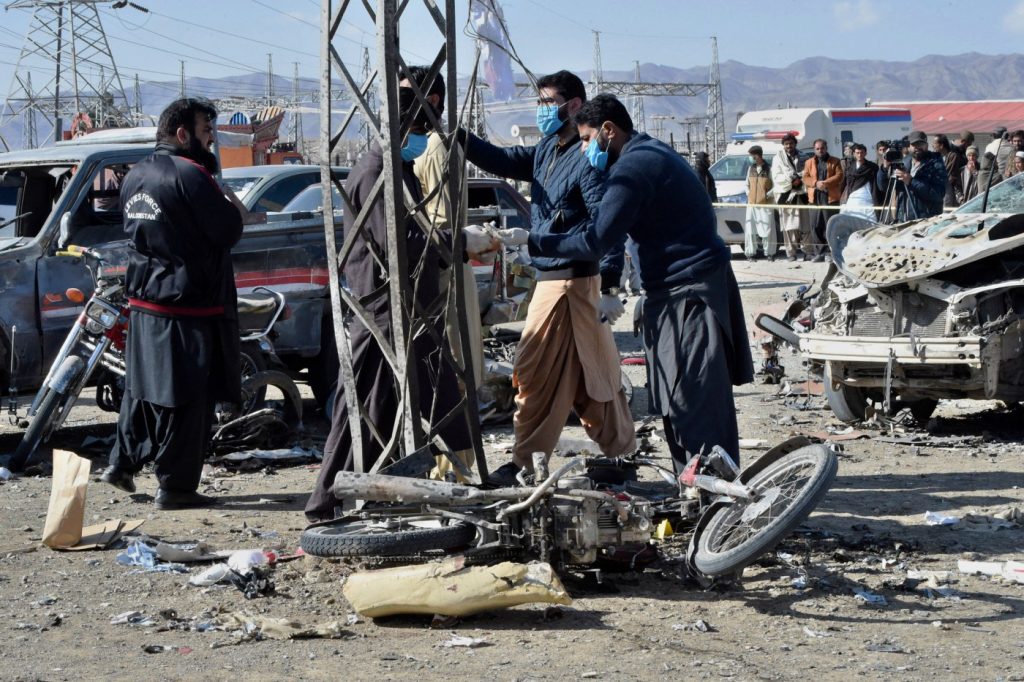By Abdul Sattar and Munir Ahmed | Associated Press
QUETTA, Pakistan — Bombs ripped through two separate political offices in southwestern Pakistan on Wednesday, killing at least 30 people, officials said, a day before the country was set to elect a new parliament.
The attacks in Baluchistan province — home to a low-level insurgency and various militant groups — have raised concerns ahead of the balloting in the troubled Western ally where many voters are already disillusioned by political feuding and a seemingly intractable economic crisis.
Violence ahead of elections and on the day of polling is common in Pakistan, which has struggled to rein in militancy. Tens of thousands of police and paramilitary forces have been deployed across the country following a recent surge in attacks, especially in Baluchistan.
Hours later, the Islamic State group’s branch in Pakistan claimed Wednesday’s second attack.
At least 18 people were killed in the first attack at independent candidate Asfandyar Khan’s election office in the Pashin district, Jumadad Mandokhel, a government official, said.
Shortly after, another bombing killed at least 12 people at the Jamiat Ulema Islam party office in Qilla Saifullah, about 130 kilometers (80 miles) away, according to Jan Achakzai, the spokesman for the provincial government. He said the elections would not be delayed despite the bombings.
The attacks, which left more than two dozen people wounded, drew condemnation from almost all political parties.
Later Wednesday, police official Arfan Bahadur said a man prematurely detonated a hand grenade in the southern port city of Karachi, killing himself and two passersby. He said it was not clear how the man got a hold of the grenade.
Jamiat Ulema Islam — a leading radical Islamist party that has close ties with Afghanistan’s Taliban — has been attacked by the Islamic State group and other militants in recent years. At least 54 people were killed in July when a suicide bomber blew himself up at a party rally. An Afghan branch of the Islamic State group claimed that attack.
Party president Fazlur Rehman and scores of candidates from the party are contesting the elections throughout the country.
Baluchistan, a gas-rich province on the border with Afghanistan and Iran, has been the scene of an insurgency for more than two decades by Baluch nationalists who are seeking independence.
The nationalists typically attack security forces — not civilian or political targets in the province. The outlawed Baluchistan Liberation Army has been behind multiple attacks on security forces, including one on Jan. 30 that killed six people.
The Pakistani Taliban, along with other militant groups, also have a strong presence in Baluchistan and have targeted civilians in recent years, though the Pakistani Taliban pledged not to attack election rallies ahead of the vote.
Related Articles
South Dakota tribe again bans governor from its land
Netanyahu rejects Hamas cease-fire demands
New pollution rules could improve air quality in Bay Area, other parts of California
Walters: Newsom’s state budget proposal already shows its shortcomings
Douthat: Only America can save the future — if it can save itself
Abdullah Khan, an analyst at the Pakistan Institute for Conflict and Security Studies, said more violence could not be ruled out on election day. He said any of a number of groups could be behind the latest bombings, including the splinter groups within the Pakistani Taliban, Islamic State, Baluch nationalists or al-Qaida.
Caretaker Prime Minister Anwaarul-Haq-Kakar denounced the attacks and conveyed his condolences to the families of those who died. He vowed that “every attempt to sabotage the law and order situation will be thwarted” and said the government is committed to holding elections Thursday in peace.
Achakzai, the provincial government spokesman, announced a three-day mourning period but emphasized that “the elections will take place on Thursday as per the schedule, and we urge people to exercise their right to vote to defeat those who wanted a delay in the elections.”
In 2007, Pakistan’s two-time prime minister, Benazir Bhutto, was killed in a gun and bomb attack, minutes after she addressed an election rally in the garrison city of Rawalpindi. Her son, Bilawal Bhutto-Zardari, has led the campaign for her Pakistan People’s Party amid tight security.
Ahmed reported from Islamabad.


